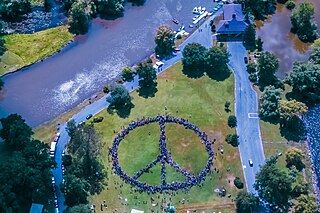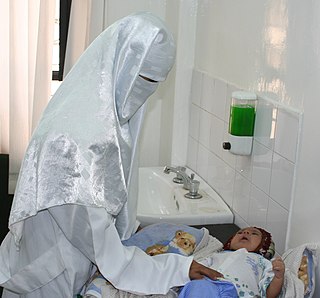Abdul Aziz Said was Professor Emeritus of International Relations in the School of International Service at American University, Washington, D.C., and founding Director of the university's International Peace and Conflict Resolution Division. Said was well known for helping shift the focus of International Relations theory from real politic-based on the concept that the law of power governs states, to new world order-based on cooperation and common security. Starting in the 1990s Said focused his work on peace and conflict resolution and later explored the relationship between spirituality and religion in international politics.

Mahdi Abdul Hadi is a political scientist, historian, columnist, author, founder and member of various Palestinian, Arab and International institutions. He founded and heads the Palestinian Academic Society for the Study of International Affairs.

Peacebuilding is an activity that aims to resolve injustice in nonviolent ways and to transform the cultural and structural conditions that generate deadly or destructive conflict. It revolves around developing constructive personal, group, and political relationships across ethnic, religious, class, national, and racial boundaries. The process includes violence prevention; conflict management, resolution, or transformation; and post-conflict reconciliation or trauma healing before, during, and after any given case of violence.
Marc Gopin, scholar and practitioner, is the director of the Center for World Religions, Diplomacy and Conflict Resolution (CRDC), and James H. Laue Professor at the School of Conflict Analysis and Resolution at George Mason University Arlington, Virginia, USA. The Association of Conflict Resolution recently awarded Gopin The Peacemaker Award for his contribution to the Conflict Resolution Field. Note that, in 2008 he also received the Andrew Thomas Peacebuilder Award from the New York State Dispute Resolution Association (NYSDRA). Gopin has pioneered peacebuilding projects at CRDC and trained thousands of peacebuilders in Afghanistan, Iran, Syria, Palestine and Israel on strategies to address complex conflicts. He studies dilemmas of values in global conflicts and diverse contexts where religion and culture play a crucial role in conflicts and conflict resolution.
The Global Partnership for the Prevention of Armed Conflict (GPPAC) is a member-led network of civil society organisations (CSOs) active in the field of conflict prevention and peacebuilding across the world. The network is organised around 15 regional networks of local organisations, each region having its own priorities, character and agenda. Each region is represented in an International Steering Group, which determines joint global priorities and actions. GPPAC was initiated through extensive consultations in 2003-4, and officially launched as part of a global conference in 2005 at the UN headquarters in New York.
The Center for World Religions, Diplomacy and Conflict Resolution (CRDC) is an arm of George Mason University's Jimmy and Rosalynn Carter School for Peace and Conflict Resolution. CRDC engages in practice, education, and research concerning peace-building in conflicts where religion and culture play a significant role in a destructive conflict. CRDC specializes in entrepreneurial engagement with partners, students and supporters who share the goal of promoting emerging networks of indigenous and global peacemakers; mobilizing support for them; and forging links between such people, citizen-diplomats, and policymakers.
Mohammed Abu-Nimer is an American expert on conflict resolution and dialogue for peace. He is a full professor at the American University School of International Service in International Peace and Conflict Resolution in Washington, DC, the largest school of international relations in the United States.

Women in Yemen have historically been placed at a disadvantage due to their gender, with a highly patriarchal society. Although the government of Yemen has made efforts that will improve the rights of women in Yemen, many cultural and religious norms, along with poor enforcement of this legislation from the Yemeni government, have prevented Yemeni women from having equal rights to men.

The Cabinet of Yemen refers to the governing body of the internationally recognized Yemen government led by the Chairman of the Presidential Leadership Council Rashad al-Alimi who replaced former President of Yemen Abdrabbuh Mansur Hadi on 7 April 2022 as the new President of Yemen. He then selected new cabinet members of the Yemeni Government.
European Peacebuilding Liaison Office (EPLO) is the independent civil society platform of European NGOs, NGO networks and think tanks which are committed to peacebuilding, and the prevention of violent conflict.

Jamal Benomar is a former UN diplomat. He worked at the UN for 25 years, including as a special envoy for Yemen and a special adviser to former Secretary-General Ban Ki-moon.

The National Dialogue Conference (NDC) was a transitional dialogue process held at the Movenpick Hotel in Sanaa, Yemen from March 18, 2013 to January 24, 2014, as part of the Yemeni crisis reconciliation efforts.

The Jimmy and Rosalynn Carter School for Peace and Conflict Resolution is a constituent college of George Mason University based near Washington, D.C., United States, with locations in Arlington, Fairfax, and Lorton, Virginia, as well as at the Mason Korea campus in Songdo, South Korea. On July 1, 2020, the School for Conflict Analysis and Resolution was renamed the Jimmy and Rossalyn Carter School for Peace and Conflict Resolution, following an announcement by the university in March 2020.

Saferworld is an international non-governmental organisation with conflict prevention and peacebuilding programmes in over 20 countries and territories in the Horn of Africa, the African Great Lakes region, Asia, the Middle East, Central Asia and the Caucasus. It was founded in Bristol, UK in 1989 and now has its main office in London.

The Yemeni Civil War is an ongoing multilateral civil war that began in late 2014 mainly between the Rashad al-Alimi-led Yemeni government and the Houthi armed movement, along with their supporters and allies. Both claim to constitute the official government of Yemen.

On 26 March 2015, Saudi Arabia, leading a coalition of nine countries from West Asia and North Africa, launched an intervention in the Yemeni Civil War in response to calls from the president of Yemen Abdrabbuh Mansur Hadi for military support after he was ousted by the Houthi movement. The conflict ignited between the government forces, the Houthi rebels and other armed groups after the draft constitution and power-sharing arrangements collapsed, despite progress in the political transition led by the United Nations at that time, leading to an escalation of violence in mid-2014. The Houthis and allied units of the armed forces seized control of Sana’a and other parts of the country in September 2014 and in the following months. This prompted President Hadi to ask Saudi Arabia to intervene against the Iranian-backed Houthis.
International reactions to the Saudi-led intervention in Yemen of 2015 were mixed. Most other Arab League nations and several Western governments backed the Saudi Arabia-led military coalition, but other governments warned against an escalation in the violent situation in Yemen.
Hind Aboud Kabawat is a Syrian-Canadian international counsel, Director of Interfaith Peacebuilding at George Mason University's Center for World Religions, Diplomacy, and Conflict Resolution and deputy head of the Syrian Negotiation Commission's Geneva Office.
Peacebuilding in Jammu and Kashmir includes confidence-building measures at a nation-state level between the governments of India and Pakistan, track two diplomacy, as well as initiatives by non-governmental organisations (NGOs), institutes and individuals. The purpose of peacebuilding in Jammu and Kashmir include conflict prevention and reduction of hostilities in the Kashmir Valley. Many countries such as Russia, United States and China have also played a de-escalatory role with regard to tensions in the region.
Thelma Arimiebi Ekiyor is a, social entrepreneur and impact investor who has served in authoritative positions within many organizations. Ekiyor has focused primarily on investing in women Entrepreneurs. She started her career supporting women in peacebuilding and empowering women and youth through financial independence and educational access. She has experience with projects in over 22 African countries. Ekiyor worked in post conflict countries like Liberia with the peace activist Leymah Gbowee.









